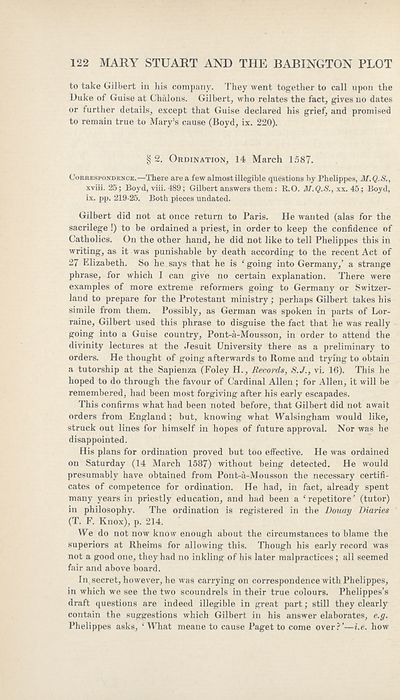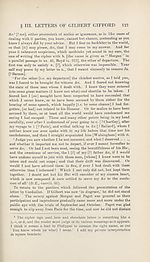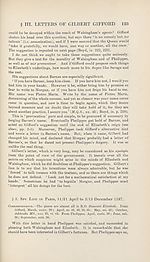Series 3 > Mary Queen of Scots and the Babington plot
(339) Page 122
Download files
Complete book:
Individual page:
Thumbnail gallery: Grid view | List view

122 MARY STUART AND THE BABINGTON PLOT
to take Gilbert in his company. They went together to call upon the
Duke of Guise at Chalons. Gilbert, who relates the fact, gives no dates
or further details, except that Guise declared his grief, and promised
to remain true to Mary’s cause (Boyd, ix. 220).
§ 2. Ordination, 14 March 1587.
Correspondence.—There are a few almost illegible questions by Phelippes, M.Q.S.,
xviii. 25; Boyd, viii. 489; Gilbert answers them: R.O. M.Q.S., xx. 45; Boyd,
ix. pp. 219-25. Both pieces undated.
Gilbert did not at once return to Paris. He wanted (alas for the
sacrilege!) to be ordained a priest, in order to keep the confidence of
Catholics. On the other hand, he did not like to tell Phelippes this in
writing, as it was punishable by death according to the recent Act of
27 Elizabeth. So he says that he is ‘ going into Germany,’ a strange
phrase, for which I can give no certain explanation. There were
examples of more extreme reformers going to Germany or Switzer¬
land to prepare for the Protestant ministry; perhaps Gilbert takes his
simile from them. Possibly, as German was spoken in parts of Lor¬
raine, Gilbert used this phrase to disguise the fact that he was really
going into a Guise country, Pont-a-Mousson, in order to attend the
divinity lectures at the Jesuit University there as a preliminary to
orders. He thought of going afterwards to Rome and trying to obtain
a tutorship at the Sapienza (Foley H., Records, S.J., vi. 16). This he
hoped to do through the favour of Cardinal Allen ; for Allen, it will be
remembered, had been most forgiving after his early escapades.
This confirms what had been noted before, that Gilbert did not await
orders from England; but, knowing what Walsingham would like,
struck out lines for himself in hopes of future approval. Nor was he
disappointed.
His plans for ordination proved but too effective. He was ordained
on Saturday (14 March 1587) without being detected. He would
presumably have obtained from Pont-a-Mousson the necessary certifi¬
cates of competence for ordination. He had, in fact, already spent
many years in priestly education, and had been a ‘ repetitore ’ (tutor)
in philosophy. The ordination is registered in the Douay Diaries
(T. F. Knox), p. 214.
We do not now know enough about the circumstances to blame the
superiors at Rheims for allowing this. Though his early record was
not a good one, they had no inkling of his later malpractices; all seemed
fair and above board.
In secret, however, he was carrying on correspondence with Phelippes,
in which we see the two scoundrels in their true colours. Phelippes’s
draft questions are indeed illegible in great part; still they clearly
contain the suggestions which Gilbert in his answer elaborates, e.g.
Phelippes asks, ‘ What meane to cause Paget to come over?’—i.e. how
to take Gilbert in his company. They went together to call upon the
Duke of Guise at Chalons. Gilbert, who relates the fact, gives no dates
or further details, except that Guise declared his grief, and promised
to remain true to Mary’s cause (Boyd, ix. 220).
§ 2. Ordination, 14 March 1587.
Correspondence.—There are a few almost illegible questions by Phelippes, M.Q.S.,
xviii. 25; Boyd, viii. 489; Gilbert answers them: R.O. M.Q.S., xx. 45; Boyd,
ix. pp. 219-25. Both pieces undated.
Gilbert did not at once return to Paris. He wanted (alas for the
sacrilege!) to be ordained a priest, in order to keep the confidence of
Catholics. On the other hand, he did not like to tell Phelippes this in
writing, as it was punishable by death according to the recent Act of
27 Elizabeth. So he says that he is ‘ going into Germany,’ a strange
phrase, for which I can give no certain explanation. There were
examples of more extreme reformers going to Germany or Switzer¬
land to prepare for the Protestant ministry; perhaps Gilbert takes his
simile from them. Possibly, as German was spoken in parts of Lor¬
raine, Gilbert used this phrase to disguise the fact that he was really
going into a Guise country, Pont-a-Mousson, in order to attend the
divinity lectures at the Jesuit University there as a preliminary to
orders. He thought of going afterwards to Rome and trying to obtain
a tutorship at the Sapienza (Foley H., Records, S.J., vi. 16). This he
hoped to do through the favour of Cardinal Allen ; for Allen, it will be
remembered, had been most forgiving after his early escapades.
This confirms what had been noted before, that Gilbert did not await
orders from England; but, knowing what Walsingham would like,
struck out lines for himself in hopes of future approval. Nor was he
disappointed.
His plans for ordination proved but too effective. He was ordained
on Saturday (14 March 1587) without being detected. He would
presumably have obtained from Pont-a-Mousson the necessary certifi¬
cates of competence for ordination. He had, in fact, already spent
many years in priestly education, and had been a ‘ repetitore ’ (tutor)
in philosophy. The ordination is registered in the Douay Diaries
(T. F. Knox), p. 214.
We do not now know enough about the circumstances to blame the
superiors at Rheims for allowing this. Though his early record was
not a good one, they had no inkling of his later malpractices; all seemed
fair and above board.
In secret, however, he was carrying on correspondence with Phelippes,
in which we see the two scoundrels in their true colours. Phelippes’s
draft questions are indeed illegible in great part; still they clearly
contain the suggestions which Gilbert in his answer elaborates, e.g.
Phelippes asks, ‘ What meane to cause Paget to come over?’—i.e. how
Set display mode to:
![]() Universal Viewer |
Universal Viewer | ![]() Mirador |
Large image | Transcription
Mirador |
Large image | Transcription
Images and transcriptions on this page, including medium image downloads, may be used under the Creative Commons Attribution 4.0 International Licence unless otherwise stated. ![]()
| Scottish History Society volumes > Series 3 > Mary Queen of Scots and the Babington plot > (339) Page 122 |
|---|
| Permanent URL | https://digital.nls.uk/127238109 |
|---|
| Attribution and copyright: |
|
|---|
| Description | Over 180 volumes, published by the Scottish History Society, containing original sources on Scotland's history and people. With a wide range of subjects, the books collectively cover all periods from the 12th to 20th centuries, and reflect changing trends in Scottish history. Sources are accompanied by scholarly interpretation, references and bibliographies. Volumes are usually published annually, and more digitised volumes will be added as they become available. |
|---|


